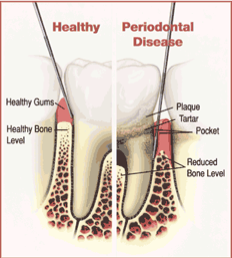During puberty, menstruation or pregnancy, there is increased production of hormones. These higher levels increase gum sensitivity and lead to greater irritations from plaque and food particles. The gums can become swollen, turn red and feel tender. The artificial use of hormones in oral contraceptives or post-menopausal hormone replacement therapy can cause similar symptoms. These symptoms usually clear up as the amounts of hormones decrease, for example once menstruation begins or pregnancy ends.
Sometimes during pregnancy, between the second and eighth months, large lumps may appear as a reaction to local irritants. These growths are generally painless and are not malignant/cancerous. They may require professional removal, but usually disappear on their own after pregnancy. Periodontal health should be part of your prenatal care. Any infections during pregnancy, including periodontal infections, can place a baby’s health at risk. There is also a higher incidence of pre-term low birth weight babies in women with periodontitis.
Changes in the look and feel of your mouth may occur if you are menopausal or post-menopausal. They include feeling pain and burning in your gum tissue as well as salty, peppery or sour tastes. Careful oral hygiene at home and professional cleaning may relieve these symptoms. There are also saliva substitutes to treat the effects of “dry mouth.”

Periodontitis is an infection of the bone and gums which surround the teeth. It is caused by the bacteria which normally reside in your mouth. When the bacteria become more numerous than normal, or at a level which your body can not tolerate, an inflammatory
reaction takes place and your body begins to destroy
the bone which supports the teeth. When the bacteria
in your mouth cause bone loss, the gum tissue does not
always recede away with the lost bone. Pockets are
created which harbor more bacteria and are unreachable
with a normal toothbrush and floss. The deep pockets
perpetuate the cycle of bone loss. The teeth subsequently
become loosened, and if not treated in a timely manner,
the teeth can even be lost.
During this process, there can be a foul odor from the
mouth, as well as infection (pus) coming from the gums.
But this process is usually painless and can sometimes
go unnoticed for quite sometime until significant
symptoms, such as bad breath or loose teeth, indicate
a problem.




The best way to prevent cavities and periodontitis is by good tooth brushing and flossing on a daily basis to remove the damaging bacteria. These bacteria cannot be eliminated from the mouth, but they can be kept under control and kept from causing more bone loss. Other factors which can negatively affect your periodontal health include tobacco smoking, diabetes, stress and hormonal changes, clenching or grinding of your teeth, certain medications, poor nutrition, and genetics. Because of these other factors, sometimes even with the most diligent oral home dental care, people still develop some form of periodontitis. If this is the case, professional intervention is necessary to prevent its continued progress. The non-surgical and surgical links on the following pages will describe in more detail what you can expect with regard to your potential care in our clinic.





Smoking
Of special mention is smoking and it’s association to periodontitis. Besides the obvious risk for oral and lung cancer, and lesser known risk for heart attack and stroke, smoking is the single strongest factor increasing the risk of bone loss in someone susceptible to periodontitis. It has been estimated to be responsible for making bone loss 6 times worse for a periodontitis patient compared to someone who is not smoking. It has even been estimated that nearly half of all the periodontitis cases in the United States could be eliminated if people would stop smoking. Smoking will also reduce your healing response to periodontal treatment by 50% and increase your risk for implant loss by 5 times. Even if you can’t quit, just by reducing your smoking habit will improve your response to therapy, although complete cessation is ideal. Medications can be prescribed to help assist you in quitting smoking, but are dependent on your desire to quit ... in other words, the medications can’t make you quit if you don’t want to quit smoking. Several links are provided below to help guide you if you are ready to quit smoking.
3125 Colby Avenue, Suite H Everett WA 98201 P: 425-374-5380 F: 425-374-5382 office@nicoaraperio.com



















